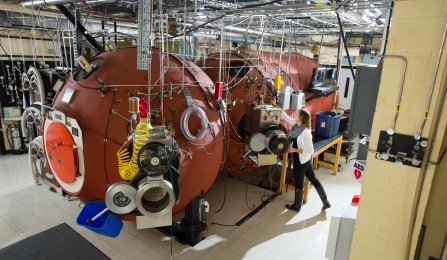Role of Oxygen Breathing on Carotid Body Sensitivity

This study will investigate the role of the carotid body chemoreceptors in ventilatory control during hyperbaric exposures when blood oxygen content is elevated.
Principal Investigator: Dave Hostler, PhD
Co-PI: Blair Johnson, PhD
Funding Agency: Office of Naval Research
Abstract: Carbon dioxide retention is common in divers during water immersion. This puts divers at risk for carbon dioxide toxicity. The carotid body chemoreceptors contribute to the control of ventilation and when blood oxygen content is high, ventilation decreases. This results in the increased risk of carbon dioxide retention. Therefore, we are investigating the role of the carotid body chemoreceptors in ventilatory control during hyperbaric exposures when blood oxygen content is elevated.



